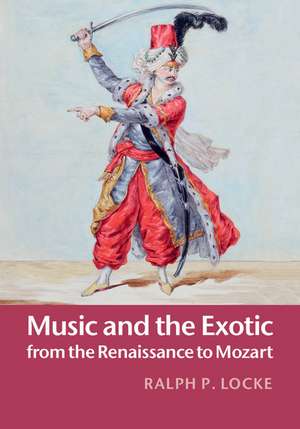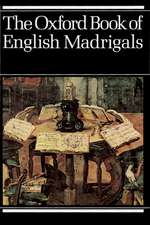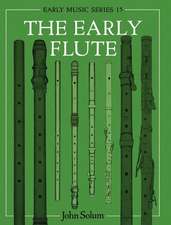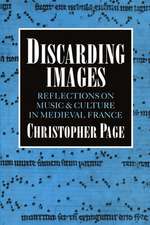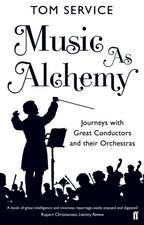Music and the Exotic from the Renaissance to Mozart
Autor Ralph P. Lockeen Limba Engleză Hardback – 6 mai 2015
| Toate formatele și edițiile | Preț | Express |
|---|---|---|
| Paperback (1) | 362.89 lei 43-57 zile | |
| Cambridge University Press – 8 noi 2017 | 362.89 lei 43-57 zile | |
| Hardback (1) | 880.31 lei 43-57 zile | |
| Cambridge University Press – 6 mai 2015 | 880.31 lei 43-57 zile |
Preț: 880.31 lei
Preț vechi: 1023.61 lei
-14% Nou
Puncte Express: 1320
Preț estimativ în valută:
168.45€ • 176.32$ • 140.20£
168.45€ • 176.32$ • 140.20£
Carte tipărită la comandă
Livrare economică 31 martie-14 aprilie
Preluare comenzi: 021 569.72.76
Specificații
ISBN-13: 9781107012370
ISBN-10: 1107012376
Pagini: 472
Ilustrații: 53 b/w illus. 25 music examples
Dimensiuni: 170 x 244 x 25 mm
Greutate: 1.09 kg
Editura: Cambridge University Press
Colecția Cambridge University Press
Locul publicării:New York, United States
ISBN-10: 1107012376
Pagini: 472
Ilustrații: 53 b/w illus. 25 music examples
Dimensiuni: 170 x 244 x 25 mm
Greutate: 1.09 kg
Editura: Cambridge University Press
Colecția Cambridge University Press
Locul publicării:New York, United States
Cuprins
Part I. Introduction: A Rich and Complex Heritage: 1. Images and principles; 2. Exotic in style?: paradigms and interpretations; Part II. The West and its Others: 3. The early cultural background; 4. Encounters; Part III. Songs and Dance-Types: 5. Popular songs; 6. Dances and instrumental styles from (or 'from') elsewhere; Part IV. Exotic Portrayals on Stage, in Concert, in Church: 7. Courtly ballets; 8. Distinctive developments in Venice and other Italian cities and courts; 9. Oratorio and other religious genres; 10. Early opera and partly sung stage-works; 11. French and Italian serious opera, especially Lully and Handel; 12. Eighteenth-century comic operas and short danced works; 13. Obsession with the Middle East: from the Parisian fairs to Mozart; Afterword: a helpfully troubling term.
Recenzii
'European encounters with Asia and the Americas found echoes in the theater, church, and chamber, as music itself found new ways to convey meaning and provoke a wide range of feelings. Ralph P. Locke's magisterial tour of the exotic takes us not only to lands both far and near, but also through changing musical worlds laced with danger and excitement.' Tim Carter, University of North Carolina, Chapel Hill
'In this immensely learned and amazingly wide-ranging companion to Musical Exoticism … Locke moves back in time to consider the musical portrayal of Otherness in European music from 1500 to 1800. [He] is a cultural historian of the highest order: he draws together a broad range of literary, historical, visual, and musical materials to demonstrate how the performing arts participated in the delineation of center and periphery, Us and Them. Particularly impressive is [his] attention to the semiotic fluidity of works in performance and his elucidation of the exotic as 'relational' rather than essential, even as he argues for a historically grounded interpretation of the musical depiction of the Other. [This book] should be required reading for anyone interested in this period, and I expect it will have a profound effect on our understanding of how the imagined Elsewhere shaped European culture.' Amanda Eubanks Winkler, Syracuse University
'With a rich and diverse set of compelling case studies, and many beautiful images, Music and the Exotic from the Renaissance to Mozart offers a gold standard for the scholarly interpretation of cross-cultural representation through music in the early modern period. Ralph P. Locke shows how Europeans used musical works to engage with the wider world, not merely as a passive reflection or commentary, but as a symbolic means of representing to themselves 'exotic' cultural identities for specific political purposes.' David R. M. Irving, Australian National University
'Fascinating, entrancing and thoroughly enjoyable. Locke's survey and (re)evaluation of works from L'homme armé masses of the fifteenth century to Mozart's portrayal of Osmin's rage in Die Entführung aus dem Serail is truly inspiring … Ambitious but nuanced explorations characteristic of post-Edward Said scholarship. Exoticism as explored by Locke … ranges across a dazzling swathe of historical material from the appropriated dance styles of folk culture to the choruses of Handel's Old Testament oratorios … This is Locke's great strength as a writer and historian: what sounds so abstruse in theory is explored with such enjoyable relish in musical examples.' Edward Breen, Gramophone
'Locke's consideration of Venetian opera, French Baroque opera and eighteenth-century [operatic] comedy is detailed and insightful.' George Hall, Opera
'This is a fascinating study which argues compellingly that exoticism - a troublesome term! - resides in relationships, which are formed within and between cultural contexts and practices. Locke identifies and evaluates the fruits of such cultural transferences during the years 1500–1800, which were based variously upon ignorance, assumption, knowledge, caricature, indifference, curiosity and admiration - and often a mix of many such perspectives. And, as he has previously shown in his companion work, Musical Exoticism, images of Otherness have been continually revived and developed in the years since - images of 'Them' which can help us to understand 'Us'.' Claire Seymour, OperaToday.com
'The only book-length study that provides a theoretically-framed, encyclopedic exposition of the pervasive phenomenon of musical exoticism during the … first long period of European exploration, conquest, and colonialism. Of particular interest is Locke's willingness to allow degrees of exoticism: there is the exoticism of peripheral regions and social groups, and that of truly remote and alien peoples and locales; exotic representation that denigrates, equivocates, or extols; and sometimes there are works here [in which] two groups are exotic but one more so than another. Locke provides a fascinating insight into [the alla turca style's] selective, generic use in opera. Locke manages to discern some ambivalence and complexity even in the extremely stereotypical role of Osmin in [Mozart's] Die Entführung as well as the unusual exotic masquerade of Così [fan tutte]. Riveting revelations are found throughout the book [and] provocative observations that continuously invite further development, discussion, and debate. Should refresh learning … at every academic level.' Shay Loya, Music Library Association Notes
'… Music and the Exotic from the Renaissance to Mozart is a major contribution to musicological scholarship, offering a fully comprehensive and imaginative exploration of musical exoticism during the years 1500–1800. Its accessible style makes it suitable as a core textbook for an undergraduate module, and for scholars working in related fields such as theatre studies, cultural history, literary criticism, and social anthropology. This ambitious study will no doubt encourage scholarship in the field by broadening the repertory under discussion and offering alternative Interpretations.' Angela Kang, Music and Letters
'When it comes to the challenge of describing and understanding the ways in which this fascination [with foreign lands and peoples] left its mark on the Western musical imagination, certainly no one has been more committed or resourceful than Professor Locke himself. … Encyclopedic in scope, [Music and the Exotic from the Renaissance to Mozart] offers thoughtful, insightful reflections on one of the most important cultural developments in the history of Western music. At the same time it manages to be admirably clearly and engagingly written. Quite an achievement!' Robert L. Marshall, Min-Ad Israel Studies in Musicology Online
'A much-needed addition to the literature. It is the first sustained study of specific [exoticist] works composed during the years 1500–1800, while it also highlights broader trends in composers' approaches to the exotic and audiences' reception of their music … Locke's book, along with his Musical Exoticism [Cambridge 2009], thus essentially redefines the exotic in relation to music and provides a model for how scholars might interpret it. … Among Locke's most insightful chapters are those treating eighteenth-century staged works. … Locke approaches [Mozart's operas] from new angles and offers fresh, thought-provoking insights into them. Engagingly written, free of jargon and lavishly illustrated with reproductions of many artworks that are little known and not readily available. … Indispensable to anyone interested in investigating exoticism in early music.' Catherine Mayes, Eighteenth-Century Music
'In this immensely learned and amazingly wide-ranging companion to Musical Exoticism … Locke moves back in time to consider the musical portrayal of Otherness in European music from 1500 to 1800. [He] is a cultural historian of the highest order: he draws together a broad range of literary, historical, visual, and musical materials to demonstrate how the performing arts participated in the delineation of center and periphery, Us and Them. Particularly impressive is [his] attention to the semiotic fluidity of works in performance and his elucidation of the exotic as 'relational' rather than essential, even as he argues for a historically grounded interpretation of the musical depiction of the Other. [This book] should be required reading for anyone interested in this period, and I expect it will have a profound effect on our understanding of how the imagined Elsewhere shaped European culture.' Amanda Eubanks Winkler, Syracuse University
'With a rich and diverse set of compelling case studies, and many beautiful images, Music and the Exotic from the Renaissance to Mozart offers a gold standard for the scholarly interpretation of cross-cultural representation through music in the early modern period. Ralph P. Locke shows how Europeans used musical works to engage with the wider world, not merely as a passive reflection or commentary, but as a symbolic means of representing to themselves 'exotic' cultural identities for specific political purposes.' David R. M. Irving, Australian National University
'Fascinating, entrancing and thoroughly enjoyable. Locke's survey and (re)evaluation of works from L'homme armé masses of the fifteenth century to Mozart's portrayal of Osmin's rage in Die Entführung aus dem Serail is truly inspiring … Ambitious but nuanced explorations characteristic of post-Edward Said scholarship. Exoticism as explored by Locke … ranges across a dazzling swathe of historical material from the appropriated dance styles of folk culture to the choruses of Handel's Old Testament oratorios … This is Locke's great strength as a writer and historian: what sounds so abstruse in theory is explored with such enjoyable relish in musical examples.' Edward Breen, Gramophone
'Locke's consideration of Venetian opera, French Baroque opera and eighteenth-century [operatic] comedy is detailed and insightful.' George Hall, Opera
'This is a fascinating study which argues compellingly that exoticism - a troublesome term! - resides in relationships, which are formed within and between cultural contexts and practices. Locke identifies and evaluates the fruits of such cultural transferences during the years 1500–1800, which were based variously upon ignorance, assumption, knowledge, caricature, indifference, curiosity and admiration - and often a mix of many such perspectives. And, as he has previously shown in his companion work, Musical Exoticism, images of Otherness have been continually revived and developed in the years since - images of 'Them' which can help us to understand 'Us'.' Claire Seymour, OperaToday.com
'The only book-length study that provides a theoretically-framed, encyclopedic exposition of the pervasive phenomenon of musical exoticism during the … first long period of European exploration, conquest, and colonialism. Of particular interest is Locke's willingness to allow degrees of exoticism: there is the exoticism of peripheral regions and social groups, and that of truly remote and alien peoples and locales; exotic representation that denigrates, equivocates, or extols; and sometimes there are works here [in which] two groups are exotic but one more so than another. Locke provides a fascinating insight into [the alla turca style's] selective, generic use in opera. Locke manages to discern some ambivalence and complexity even in the extremely stereotypical role of Osmin in [Mozart's] Die Entführung as well as the unusual exotic masquerade of Così [fan tutte]. Riveting revelations are found throughout the book [and] provocative observations that continuously invite further development, discussion, and debate. Should refresh learning … at every academic level.' Shay Loya, Music Library Association Notes
'… Music and the Exotic from the Renaissance to Mozart is a major contribution to musicological scholarship, offering a fully comprehensive and imaginative exploration of musical exoticism during the years 1500–1800. Its accessible style makes it suitable as a core textbook for an undergraduate module, and for scholars working in related fields such as theatre studies, cultural history, literary criticism, and social anthropology. This ambitious study will no doubt encourage scholarship in the field by broadening the repertory under discussion and offering alternative Interpretations.' Angela Kang, Music and Letters
'When it comes to the challenge of describing and understanding the ways in which this fascination [with foreign lands and peoples] left its mark on the Western musical imagination, certainly no one has been more committed or resourceful than Professor Locke himself. … Encyclopedic in scope, [Music and the Exotic from the Renaissance to Mozart] offers thoughtful, insightful reflections on one of the most important cultural developments in the history of Western music. At the same time it manages to be admirably clearly and engagingly written. Quite an achievement!' Robert L. Marshall, Min-Ad Israel Studies in Musicology Online
'A much-needed addition to the literature. It is the first sustained study of specific [exoticist] works composed during the years 1500–1800, while it also highlights broader trends in composers' approaches to the exotic and audiences' reception of their music … Locke's book, along with his Musical Exoticism [Cambridge 2009], thus essentially redefines the exotic in relation to music and provides a model for how scholars might interpret it. … Among Locke's most insightful chapters are those treating eighteenth-century staged works. … Locke approaches [Mozart's operas] from new angles and offers fresh, thought-provoking insights into them. Engagingly written, free of jargon and lavishly illustrated with reproductions of many artworks that are little known and not readily available. … Indispensable to anyone interested in investigating exoticism in early music.' Catherine Mayes, Eighteenth-Century Music
Notă biografică
Descriere
Ralph P. Locke provides fresh insights into Western culture's increasing awareness of ethnic Otherness during the years 1500–1800.
